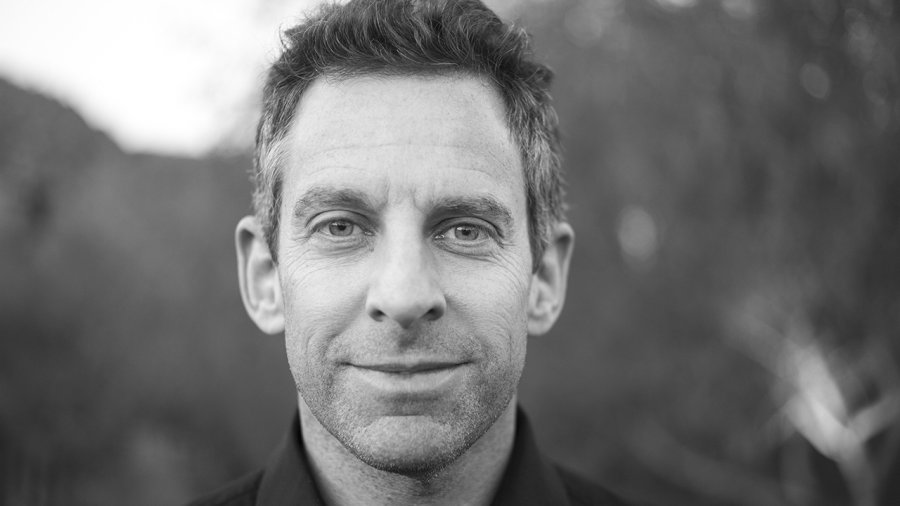For reasons difficult to discern, a lot of people hate Sam Harris.
Corey Mohler, the creator of Existential Comics (a comic I enjoy), is one example of the breed of inexplicably vitriolic Harris-haters:
The fact that @SamHarrisOrg is popular and people care about anything he has to say is evidence enough that a benevolent God doesn't exist.
— Existential Comics (@existentialcoms) March 15, 2017
.@SamHarrisOrg why'd you try to debate Chomsky?! Isn't Russell Brand more your speed? Or…a parrot that was taught some clever catch phrases?
— Existential Comics (@existentialcoms) May 4, 2015
Funny thing is, before I ever actually investigated Sam Harris’ work, I assumed the criticism I saw was probably well-founded. Surely all these seemingly intelligent people wouldn’t hate this guy if he didn’t actually suck, right?
Wrong.
Eventually my good friend Jon Brooks convinced me to actually listen to Sam Harris’ podcast, and what I found was pretty stunning:
Harris was one of the most measured, articulate, earnest truth-seekers I had ever had the pleasure of listening to.
He had a calm, sincere tone of voice, reminiscent of David Foster Wallace’s. He asked great, incisive questions. He was one of the most eloquent orators I had ever encountered.
And above all, it quickly became apparent that Sam Harris genuinely cared about the truth. He clearly wanted to have meaningful conversations—even if they were difficult—conversations that would enable the participants to gain a more accurate, nuanced understanding of the topic at hand. Dude had intellectual integrity.
I found this quality distinctly endearing and I rapidly felt a certain kinship, a deep affinity for Harris. He and I were wired similarly.
Over time, this affinity has blossomed into a full-fledged love for the man. I think Sam Harris is a luminous mind, a stelliferous human being.
In time I also began to understand why so many people loathe Sam Harris. Ironically, it’s for the same reason I love him: Because he’s not afraid to ask difficult, uncomfortable questions, and he’s not afraid to give difficult, uncomfortable answers, if he believes them to be the truth.
A lot of people don’t like this quality—this intellectual tenacity. They think they do, in the abstract, but when it comes down to it, there are a lot of questions they don’t want to ask and a lot of ideas they don’t want to consider—particularly ideas which trip their Political Incorrectness Detectors.
And that’s a damn shame, because this knee-jerk dismissiveness of any thinker who delves into controversial territory prevents many people from reaping the gifts bestowed by many great (yet contentious) thinkers—Sam Harris, Camille Paglia, Jordan Peterson, and Peter Singer, to name just a few.
Do I agree with all of Sam Harris’ claims about reality? Of course not! Have I gained tremendous value from listening to him converse with other thoughtful people? Absolutely.
His podcast singlehandedly got me into podcasts in a way I hadn’t been before. Now I often listen to podcasts while cooking, driving, or working out—times when it’s difficult or impossible to read. They’re fantastic for passive intellectual stimulation.
And Sam Harris’ podcast is one of the best out there—my personal favorite. Without further ado, here are the seven most captivating and world-broadening episodes I’ve listened to. I really can’t recommend these enough.
1. What is Technology Doing to Us?: A Conversation With Tristan Harris
https://www.youtube.com/watch?v=ZSNtj6aBKKY
This recent episode is hyper-relevant to the present moment, and it’s not an exaggeration to say that you will never look at the Internet in the same way after listening to it. It’s an interview with Tristan Harris, an ex-design ethicist at Google, an expert in the ethics of technological persuasion, and an astoundingly insightful guy.
Harris and Harris discuss “the arms race for human attention, the ethics of persuasion, the consequences of having an ad-based economy, the dynamics of regret, and other topics.”
2. Evolving Minds: A Conversation With Jonathan Haidt
https://www.youtube.com/watch?v=IsDAhkXFrts
I’ve made my love for Jonathan Haidt quite clear in recent times. He’s a moral psychologist and one of the smartest and most captivating scientists I’ve ever encountered. I’ve recommended his book, The Righteous Mind: Why Good People are Divided by Politics and Religion, more frequently than any other book in recent memory.
So, naturally, I was incredibly eager to listen to this interview, and it did not disappoint. Harris and Haidt discuss the troubling evolution of political-correctness ideology on college campuses, Haidt’s controversial view that religion has an evolutionary basis, and the scientific study of morality.
3. Meaning and Chaos: A Conversation With Jordan Peterson
https://www.youtube.com/watch?v=2N6RNI03BjY
Jordan Peterson is a controversial and irresistibly fascinating Canadian psychology professor who has risen to notoriety in recent times due to his outspoken criticism of what he sees as the overreaches of the identity-politics and political-correctness crowds. He’s much more than a political commentator, though. I highly recommend his interview with Joe Rogan (possibly the best podcast episode I’ve ever listened to), his ‘Message to Millennials’ on how to properly change the world, and his ‘New Years Letter to the World.’ To be clear, I don’t agree with all of Dr. Peterson’s views (or anyone’s), but he’s always thought-provoking and often profound.
As it turns out, Sam Harris’ audience requested Jordan Peterson more than any other guest in Harris’ podcast’s history. They’ve spoken twice so far; this was the second (and in my opinion better) conversation, in which they cover a wide range of topics related to the importance of science and religion and their roles in civilization; the significance of archetypes and mythology; and the timeless problem of how to find meaning in life.
4. Being Good and Doing Good: A Conversation With Will MacAskill
https://www.youtube.com/watch?v=Ih2pttoom_M
This episode might just change your life. Will MacAskill is a professor at the University of Oxford and a notable figure within the Effective Altruism movement—a movement which is dear to my heart and which I’ve written about on multiple occasions. MacAskill is the (co-)founder of two Effective Altruism organizations: the incredible high-impact-career-identification organization 80,000 Hours and the effective-giving organization Giving What We Can.
The ideas found within the Effective Altruism movement will change the way you think about charitable giving and helping the world in general. This episode is a great place to start. In it, Harris and MacAskill discuss Effective Altruism, moral illusions, existential risk, population ethics, and other topics.
5. Racism and Violence in America: A Conversation With Glenn C. Loury
https://www.youtube.com/watch?v=5teNL3oI5pI
This episode is, bar none, the most insightful and constructive conversation about race I’ve ever heard, anywhere, in person or online. In it, Harris speaks with the brilliant African-American economist Glenn C. Loury about racism, police violence, the Black Lives Matter movement, and relevant statistics, among other things.
6. The Logic of Violence: A Conversation With Jocko Willink
https://www.youtube.com/watch?v=DFQ5H3zpkMU
Whatever your perspective on war, this podcast will give you a tremendous amount of food for thought. Before listening to this interview with Jocko Willink, an ex-Navy SEAL, I was basically of the opinion that war and/or military action were never justified. But this episode gave me a lot to think about and forced me to update my views to accommodate certain situations in which nothing short of violence can stop a malevolent world-threatening force.
Nowadays I’m something like 95% pacifist, believing that war and violence should never be resorted to unless nothing else will suffice. I think, for instance, that military intervention was justified to stop Hitler and the Nazis in WWII. That should give you an idea of the mind-changing force of this episode; it’s really worth a listen. If you appreciate it, Tim Ferriss also interviewed Willink a couple years ago, and they had a spectacular conversation.
7. What is Moral Progress?: A Conversation With Peter Singer
https://www.youtube.com/watch?v=yAwcpFGu2Y4
If you’re at all interested in philosophy, Peter Singer is a household name. He’s a moral philosopher and a key figure in the Effective Altruism movement, famous for his unflinching utilitarianism and his advocacy for animal rights. He authored The Most Good You Can Do: How Effective Altruism is Changing Ideas About Living Ethically, a book I highly recommend.
Singer is a rigorous thinker who doesn’t shy away from controversial positions, if he believes them to be correct, and I love him for that. In this stimulating conversation, he and Harris discuss “the foundations of morality, expanding the circle of our moral concern, politics, free speech, conspiracy thinking, Edward Snowden, the importance of intentions, WWII, euthanasia, eating ‘happy cows,’ and other topics.”
In Sum
In sum, listen to Sam Harris’ podcast.
I don’t care what you’ve heard about him, or what you think he represents. Listen to a bunch of his actual words, and then form an opinion.
Cool? Cool.
Cheers to Sam, and cheers to the endless pursuit of truth and wisdom.
———
P.S. If you’re unaware, I make unusual, intellectual rap music. Yesterday I released a new album—an attempt to come to terms with many of the most serious issues facing humanity, among other things. You can listen to it for free here. Thank you, from the bottom of me, to all who take the time to listen, ponder, and support the project!
About Jordan Bates
Jordan Bates is a Lover of God, healer, mentor of leaders, writer, and music maker. The best way to keep up with his work is to join nearly 7,000 people who read his Substack newsletter.





[…] some prompting last year from my dear friend Jon Brooks, I checked out Harris’ Waking Up podcast, and what I found was really quite […]
[…] some prompting last year from my dear friend Jon Brooks, I checked out Harris’ Waking Up podcast, and what I found was really quite […]
I agree with you! I love Sam Harris Podcasts because he sounds (and I hope he is) so truthfully reasonable. Ready to consider any valid question seriously n properly! AND yes MOST even damn nice people seem to hate him precisely because they are intellectually lazy and morally scared and comfortable in the grey zones of political correctness. They want to question up to a point..no further. They want to state a position and stay on that position fielding only questions that allow them to stay on that position! Ask anything that will shake their ground or make them leave… Read more »
Very well said. Good to know you’re out there—it gives me hope that Harris has many thousands of fans. : ]
Very disappointed by your “challenge.” For the price you charge, I was expecting more. Your “book” is basically full of platitudes and quotes freely available online. And I even suspect instances of plagiarism in there. It’s too expensive for what it is. You are not as enlightened as I thought you were… you’re just selling an idea of enlightenment to your unsuspecting audience desperate for THE answer. And I’m sad to say that I fell for it 🙁